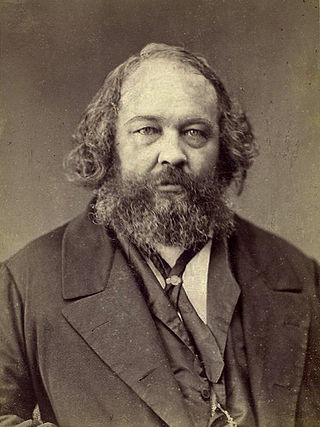Anarchism is a political philosophy and movement that is against all forms of authority and seeks to abolish the institutions it claims maintain unnecessary coercion and hierarchy, typically including the state and capitalism. Anarchism advocates for the replacement of the state with stateless societies and voluntary free associations. As a historically left-wing movement, this reading of anarchism is placed on the farthest left of the political spectrum, usually described as the libertarian wing of the socialist movement.
Individualist anarchism is the branch of anarchism that emphasizes the individual and their will over external determinants such as groups, society, traditions, and ideological systems. Although usually contrasted with social anarchism, both individualist and social anarchism have influenced each other. Mutualism, an economic theory sometimes considered a synthesis of communism, market economy and property, has been considered individualist anarchism and other times part of social anarchism. Many anarcho-communists regard themselves as radical individualists, seeing anarcho-communism as the best social system for the realization of individual freedom. Some anarcho-capitalists claim anarcho-capitalism is part of the individualist anarchist tradition, while others disagree and claim individualist anarchism is only part of the socialist movement and part of the libertarian socialist tradition. Economically, while European individualist anarchists are pluralists who advocate anarchism without adjectives and synthesis anarchism, ranging from anarcho-communist to mutualist economic types, most American individualist anarchists of the 19th century advocated mutualism, a libertarian socialist form of market socialism, or a free-market socialist form of classical economics. Individualist anarchists are opposed to property that violates the entitlement theory of justice, that is, gives privilege due to unjust acquisition or exchange, and thus is exploitative, seeking to "destroy the tyranny of capital,—that is, of property" by mutual credit.
Individualism is the moral stance, political philosophy, ideology and social outlook that emphasizes the intrinsic worth of the individual. Individualists promote realizing one's goals and desires, valuing independence and self-reliance, and advocating that the interests of the individual should gain precedence over the state or a social group, while opposing external interference upon one's own interests by society or institutions such as the government. Individualism makes the individual its focus, and so starts "with the fundamental premise that the human individual is of primary importance in the struggle for liberation".
Anarchist communism is a political philosophy and anarchist school of thought that advocates communism. It calls for the abolition of private property but retention of personal property and collectively-owned items, goods, and services. It supports social ownership of property and the distribution of resources "From each according to his ability, to each according to his needs".
Libertarian socialism is an anti-authoritarian and anti-capitalist political current that emphasises self-governance and workers' self-management. It is contrasted from other forms of socialism by its rejection of state ownership and from other forms of libertarianism by its rejection of private property. Broadly defined, it includes schools of both anarchism and Marxism, as well as other tendencies that oppose the state and capitalism.

Mikhail Alexandrovich Bakunin was a Russian revolutionary anarchist. He is among the most influential figures of anarchism and a major figure in the revolutionary socialist, social anarchist, and collectivist anarchist traditions. Bakunin's prestige as a revolutionary also made him one of the most famous ideologues in Europe, gaining substantial influence among radicals throughout Russia and Europe.

Freethought is an epistemological viewpoint which holds that beliefs should not be formed on the basis of authority, tradition, revelation, or dogma, and should instead be reached by other methods such as logic, reason, and empirical observation.
According to different scholars, the history of anarchism either goes back to ancient and prehistoric ideologies and social structures, or begins in the 19th century as a formal movement. As scholars and anarchist philosophers have held a range of views on what anarchism means, it is difficult to outline its history unambiguously. Some feel anarchism is a distinct, well-defined movement stemming from 19th-century class conflict, while others identify anarchist traits long before the earliest civilisations existed.
Anarchist economics is the set of theories and practices of economic activity within the political philosophy of anarchism. Anarchists are anti-authoritarian and anti-capitalist, with anarchism usually referred to as a form of libertarian socialism, i.e. a stateless system of socialism. Anarchists support personal property and oppose capital concentration, interest, monopoly, private ownership of productive property such as the means of production, profit, rent, usury and wage slavery which are viewed as inherent to capitalism.
The nature of capitalism is criticized by left-wing anarchists, who reject hierarchy and advocate stateless societies based on non-hierarchical voluntary associations. Anarchism is generally defined as the libertarian philosophy which holds the state to be undesirable, unnecessary and harmful as well as opposing authoritarianism, illegitimate authority and hierarchical organization in the conduct of human relations. Capitalism is generally considered by scholars to be an economic system that includes private ownership of the means of production, creation of goods or services for profit or income, the accumulation of capital, competitive markets, voluntary exchange and wage labor, which have generally been opposed by most anarchists historically. Since capitalism is variously defined by sources and there is no general consensus among scholars on the definition nor on how the term should be used as a historical category, the designation is applied to a variety of historical cases, varying in time, geography, politics and culture.
Anarchists have traditionally been skeptical of or vehemently opposed to organized religion. Nevertheless, some anarchists have provided religious interpretations and approaches to anarchism, including the idea that the glorification of the state is a form of sinful idolatry.
Anarchism is generally defined as the political philosophy which holds the state to be undesirable, unnecessary and harmful as well as opposing authority and hierarchical organization in the conduct of human relations. Proponents of anarchism, known as anarchists, advocate stateless societies based on non-hierarchical voluntary associations. While anarchism holds the state to be undesirable, unnecessary and harmful, opposition to the state is not its central or sole definition. Anarchism can entail opposing authority or hierarchy in the conduct of all human relations.
Individualist anarchism in the United States was strongly influenced by Benjamin Tucker, Josiah Warren, Ralph Waldo Emerson, Lysander Spooner, Pierre-Joseph Proudhon, Max Stirner, Herbert Spencer and Henry David Thoreau. Other important individualist anarchists in the United States were Stephen Pearl Andrews, William Batchelder Greene, Ezra Heywood, M. E. Lazarus, John Beverley Robinson, James L. Walker, Joseph Labadie, Steven Byington and Laurance Labadie.
Anarchism in India first emerged within the Indian independence movement, gaining particularly notoriety for its influence on Mohandas Gandhi's theory of Sarvodaya and his practice of nonviolent resistance. Anarchism was also an influence on the revolutionary movement, inspiring the works of Har Dayal, M. P. T. Acharya and Bhagat Singh, among others.
The following outline is provided as an overview of and topical guide to anarchism:
Anarchy is a form of society without rulers. As a kind of stateless society, it is commonly contrasted with states, which are centralised polities that claim a monopoly on violence over a permanent territory. Beyond a lack of government, it can more precisely refer to societies that lack any form of authority or hierarchy. While viewed positively by anarchists, the primary advocates of anarchy, it is viewed negatively by advocates of statism, who see it in terms of social disorder.
Anarchism in Romania developed in the 1880s within the larger Romanian socialist movement and it had a small following throughout all the existence of the Kingdom of Romania. Social anarchism was initially propagated by the Revista Ideei during the time of the Old Kingdom, but following the rise of Bolshevism, socialist tendencies were sidelined in favor of individualism and vegetarianism, which were the predominant anarchist tendencies in Romania during the 1920s and 1930s.
Social anarchism, also known as left-wing anarchism or socialist anarchism, is the branch of anarchism that sees liberty and social equality as interrelated.
Collectivist anarchism, also called anarchist collectivism and anarcho-collectivism, is an anarchist school of thought that advocates the abolition of both the state and private ownership of the means of production. In their place, it envisions both the collective ownership of the means of production and the entitlement of workers to the fruits of their own labour, which would be ensured by a societal pact between individuals and collectives. Collectivists considered trade unions to be the means through which to bring about collectivism through a social revolution, where they would form the nucleus for a post-capitalist society.
Anarchism and libertarianism, as broad political ideologies with manifold historical and contemporary meanings, have contested definitions. Their adherents have a pluralistic and overlapping tradition that makes precise definition of the political ideology difficult or impossible, compounded by a lack of common features, differing priorities of subgroups, lack of academic acceptance, and contentious historical usage.




